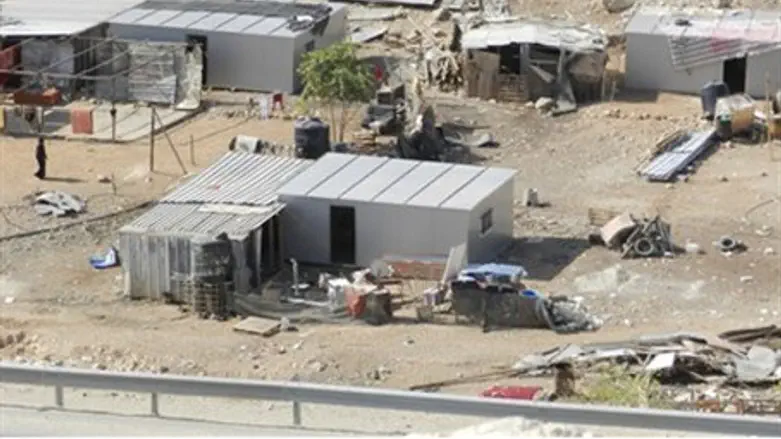
Israel has once again appealed to the European Union to stop funding illegal Palestinian building in Area C of Judea and Samaria.
According to Aviv Shir-On, Deputy Director General for European Affairs in the Foreign Ministry, Israel “brings up this matter every time we speak to the Europeans. We will not permit illegal construction in Area C.”
Speaking before the subcommittee on Judea and Samaria of the Knesset Foreign Affairs and Defense Committee, Shir-On noted that Israel has told the EU it will not hesitate to demolish illegally built structures, whether in Jewish towns or Arab villages, although he added that in the case of the latter, Israel informs the EU before action is taken.
Under the 1993 Oslo Accords - signed not only by Israel and the Palestinian Authority, but by the EU itself, among other parties - while the PA maintains full or partial control over Areas A and B of Judea-Samaria ("West Bank"), Israel maintains exclusive military and civilian authority over affairs in Area C, including planning and construction.
As a result, Israeli NGO Im Tirzu has slammed EU over its role in financing illegal Arab settlements in Judea and Samaria, saying its direct attempts to "subvert" Israeli internal affairs amounted to a form of "colonialism."
The revelations - first exposed by the Regavim NGO and initially reported by Arutz Sheva - would amount to a flagrant breach of international law by the EU, the group said.
"It's not enough that the European Union finances Israeli BDS organizations who work to erase Israel's Jewish and democratic identity from within, but now the EU is openly fighting against (Israeli) communities by financing illegal building for Bedouins," Im Tirzu's CEO Matan Peleg said in a statement to Arutz Sheva.
"The European Union's subversion of the internal affairs of the State of Israel is anti-democratic and colonialist in nature," he charged, adding that such policies "also seriously harm the just and legitimate integration of the Bedouin sector into Israeli society" by encouraging law-breaking, he added.
Shir-On said that Israel was taking a greater interest in the matter than ever before, and that the Foreign Ministry and the IDF would work together to prevent such construction from taking place.
In a response issued by its embassy in Tel Aviv on Wednesday, as quoted by the Jerusalem Post, the EU said that all its activities in Judea and Samaria are “fully in line with international humanitarian law."
"While Israel has overall security and administrative responsibility in Area C, under international law Israel also has the obligation to protect and facilitate development for the local population, and to grant unimpeded access for humanitarian assistance. The EU Is providing humanitarian aid to allow the residents to meet their most basic needs of shelter and sanitation,” the EU said.
Hinting that the fault was Israel's for failing to provide sufficient legal paths to ensure housing for Palestinians, the EU wrote in its response that “to date only a handful of the proposed [housing] plans have been approved."
"At their last meeting in July the EU foreign ministers unanimously voiced their strong opposition to Israeli demolitions and confiscations, including of EU-funded projects, and called for a fundamental change of Israeli policy to enable accelerated Palestinian construction, as well as social and economic development in Area C.”